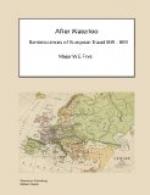Judge, my friend, of my astonishment and that of almost everybody in this city, at the news which was circulated here early on the morning of the 19th, and has been daily confirmed, viz., that the French Army had been completely defeated and was in full flight, leaving behind it 220 pieces of cannon and all its baggage, waggons and munitions de guerre. I have not been able to collect all the particulars, but you will no doubt hear enough of it, for I am sure it will be said or sung by all the partisans of the British ministry and all the Tories of the United Kingdom for months and years to come; for further details, therefore, I shall refer you to the Gazette. The following, however, you may consider as a tolerably fair precis of what took place. The attack began on the 18th about ten o’clock[16] and raged furiously along the whole line, but principally at Hougoumont, a large Metairie on the right of our position, which was occupied by our troops, and from which all the efforts of the enemy could not dislodge them. The slaughter was terrible in this quarter. From twelve o’clock till evening several desperate charges of cavalry and infantry were made on the rest of our line. Both sides fought with the utmost courage and obstinacy, and were prodigal of life in the extreme. But it is generally supposed that our army must have succumbed towards the evening had it not been for the arrival of Bulow’s division of Prussians, followed closely by Blucher and the rest of the army, which had rallied with uncommon celerity. These moved on the right flank of the French, and decided the fortune of the day by a charge which was seconded by a general charge from the whole of the English line on the centre and left of the French. Seeing themselves thus turned, a panic, it is said, spread among the young Guard of the French army, and a cry of “Sauve qui peut! nous sommes trahis!” spread like wildfire. The flight became universal; the old Guard alone remained, refused quarter and perished like Leonidas and his Spartans. The Prussian cavalry being fresh pursued the enemy all night, l’epee dans les reins, and it may be conceived from their previous disposition that they would not be very merciful to the vanquished. Indeed, on the 15th, it is said that the French were not very merciful to them. It was like the combat of Achilles and Hector.
No thought but rage and never ceasing
strife
Till death extinguish rage and thought
and life.
France will now call out to Napoleon as Augustus did to Varus, “Give me back my legions!” The loss on both sides was very great, but it must have been prodigious on the side of the French. The whole Allied Army is in full pursuit. Several friends and acquaintances of mine perished in this battle, viz., Lieut.-General Sir T. Picton, Colonel Sir H. Ellis and Colonel Morice.
June 22.




